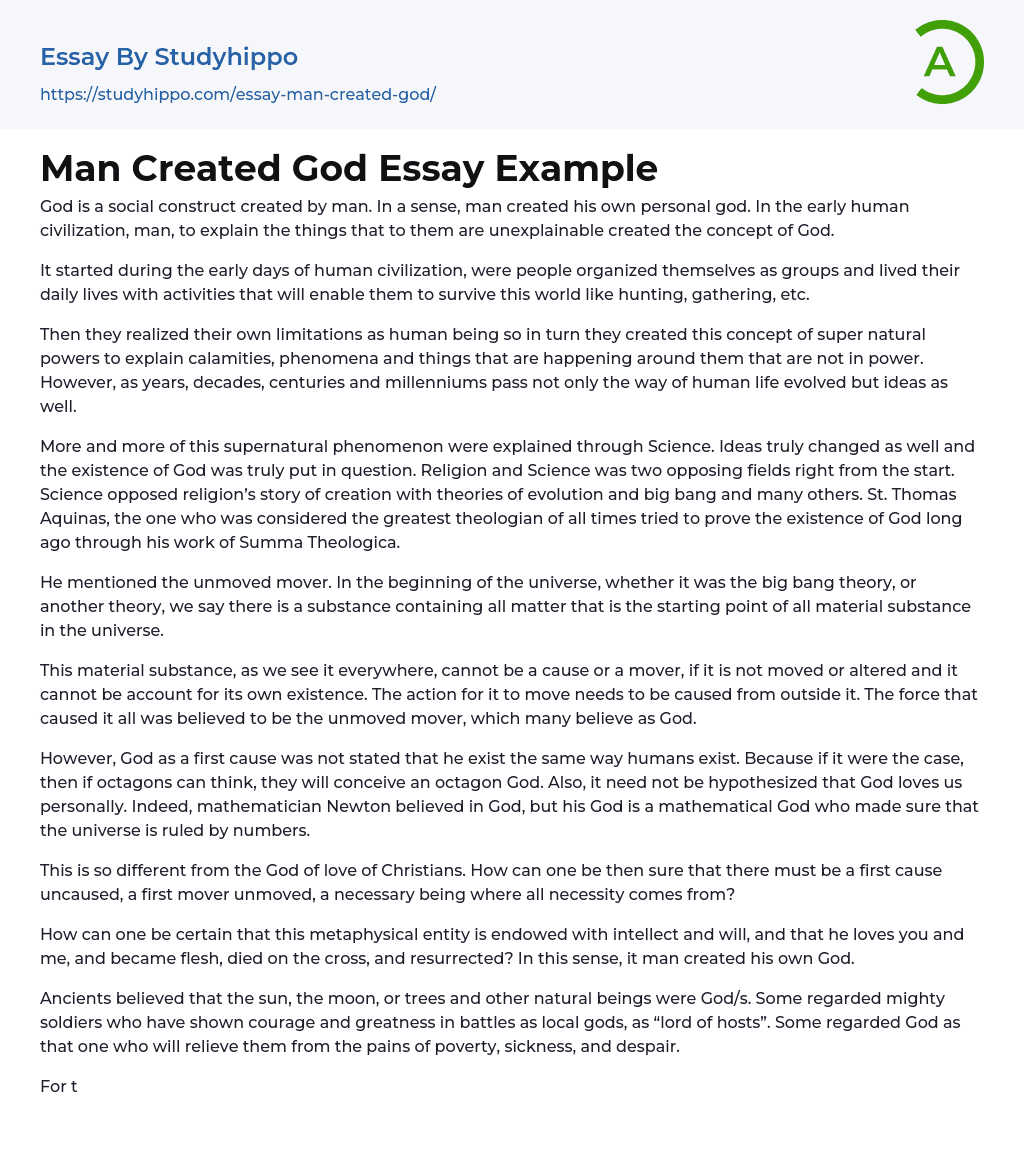The concept of God was created by early human civilization as a social construct to explain phenomena that couldn't be understood.
During the early days of human civilization, people formed groups and engaged in activities such as hunting and gathering, which were essential for their survival in this world.
As time has passed, humans have recognized their limitations and developed the notion of supernatural abilities in order to comprehend events that are beyond their control. However, over the course of years, decades, centuries, and millennia, both human existence and ideas have undergone transformative changes.
Advancements in science have brought clarity to many supernatural events, prompting a reconsideration of beliefs and the recognition of God's involvement. The ongoing dispute between Religion and Science stems from
...scientific evidence that challenges religious interpretations, including evolution and the big bang theory. St. Thomas Aquinas, renowned as history's most prominent theologian, sought to establish the existence of God through his influential work, Summa Theologica.
The concept of the unmoved mover is responsible for initiating all material substance in the universe, including the beginning of the universe according to theories like the big bang theory and other theories.
One can see this material substance everywhere, which requires an external force to start its motion. Additionally, this substance cannot explain its own existence or go through any changes without the help of something outside itself. As a result, many people believe that the unmoved mover, often connected with God, is responsible for all movement.
Even if God's existence is not believed to be similar to that of humans as a first cause
octagons would also believe in an octagon God if that were the case. Additionally, there is no need to assume that God loves us individually. It is worth mentioning that mathematician Newton's belief in God centered on a mathematical deity who ensured that numbers govern the universe.
The God worshipped by Christians, who is often perceived as a loving deity, differs significantly from the god mentioned. The presence of an uncaused first cause, an unmoved first mover, and a necessary being that serves as the origin of all necessity can be subject to doubt.
How can one have assurance that this metaphysical entity possesses intellect and will, and has affection for you and me, and took on physical form, perished on the cross, and was revived? In this regard, it is humanity that formed their own deity.
The ancients held diverse beliefs regarding gods, including the sun, moon, trees, and other natural entities. Certain individuals even regarded courageous soldiers who demonstrated bravery in battles as local deities referred to as the "lord of hosts." Furthermore, some people perceived God as the entity capable of relieving them from poverty, illness, and despair.
Different religions have different perceptions of God. In Islam, Allah is the known name for God and Muhammad was chosen by Him to communicate the message of the One True God. In Christianity, God is understood as the Father, Son, and Holy Spirit. These examples demonstrate the varied perspectives that different religions hold regarding their Supreme Being.
The common factor shared by all religions is the important question to consider. Despite their number, different religions do have similarities.
justify;">The desire for something greater than oneself is present in every person. Those who have faith in a higher power often call this longing the "restless heart seeking rest in God". From a sociological perspective, this yearning can be traced back to the societal construct that we are taught from infancy – the belief that we originate from dust and will eventually go back to it. However, it is the concept of a divine being that gives us hope for eternal life.
- Age Of Enlightenment essays
- Ethos essays
- Time essays
- Acceptance essays
- Meaning Of Life essays
- Reality essays
- Natural Law essays
- Political Philosophy essays
- Utilitarianism essays
- Existence essays
- Free Will essays
- Good And Evil essays
- Confucianism essays
- Relativism essays
- Conscience essays
- Environmentalism essays
- Empiricism essays
- Epistemology essays
- Ethics essays
- Existentialism essays
- Human Nature essays
- Individualism essays
- Metaphysics essays
- Philosophy Of Life essays
- Transcendentalism essays
- Truth essays
- Destiny essays
- Determinism essays
- Fate essays
- Functionalism essays
- Philosophers essays
- Pragmatism essays
- Future essays
- Child Observation essays
- Critical Reflection essays
- Teaching Philosophy essays
- Personal Philosophy essays
- Action Speak Louder Than Words essays
- Can Money Buy Happiness essays
- Values of Life essays
- Ethical dilemma essays
- Normative Ethics essays
- Virtue Ethics essays
- Belief essays
- Deontology essays
- Moral essays
- Virtue essays
- Work Ethic essays
- Henry David Thoreau essays
- Carl Jung essays


Unfortunately copying the content is not possible
Tell us your email address and we’ll send this sample there.
By continuing, you agree to our Terms and Conditions.


